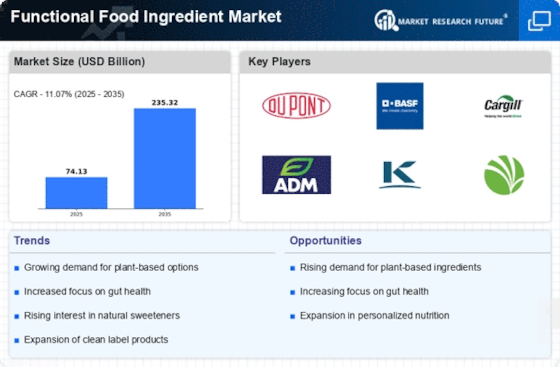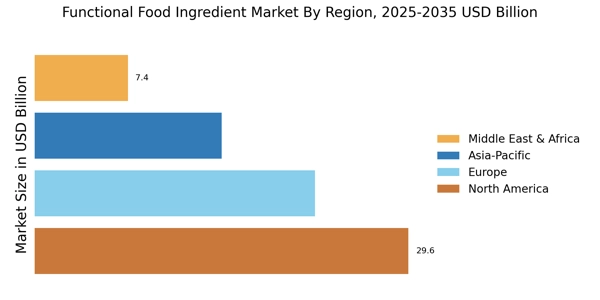Aging Population
The demographic shift towards an aging population is significantly influencing the Functional Food Ingredient Market. As the global population ages, there is a growing demand for products that cater to the health needs of older adults. Functional ingredients that promote cognitive health, joint support, and heart health are becoming increasingly sought after. Market analysis suggests that the segment of functional foods targeting seniors is expected to witness substantial growth, potentially reaching a market value of several billion dollars by 2026. This trend underscores the necessity for manufacturers to develop specialized products that address the unique health concerns of this demographic, thereby driving the Functional Food Ingredient Market.
Rising Consumer Awareness
The increasing awareness among consumers regarding health and nutrition is a pivotal driver for the Functional Food Ingredient Market. As individuals become more informed about the benefits of functional foods, they actively seek products that enhance their well-being. This trend is reflected in market data, which indicates that the demand for functional ingredients is projected to grow at a compound annual growth rate of approximately 8% over the next five years. Consumers are particularly interested in ingredients that support immunity, digestive health, and overall vitality. This heightened awareness is prompting manufacturers to innovate and incorporate functional ingredients into their offerings, thereby expanding the Functional Food Ingredient Market.
Technological Advancements
Technological advancements in food processing and ingredient formulation are propelling the Functional Food Ingredient Market forward. Innovations such as microencapsulation and fermentation techniques are enhancing the bioavailability and efficacy of functional ingredients. These advancements allow for the development of more effective products that meet consumer demands for convenience and health benefits. For instance, the integration of probiotics into various food products has gained traction, with market data indicating a significant increase in probiotic-infused foods. As technology continues to evolve, it is likely that new functional ingredients will emerge, further expanding the possibilities within the Functional Food Ingredient Market.
Regulatory Support for Health Claims
Regulatory support for health claims associated with functional ingredients is fostering growth in the Functional Food Ingredient Market. Governments and regulatory bodies are increasingly recognizing the importance of functional foods in public health. This recognition is leading to clearer guidelines and support for health claims, which in turn encourages manufacturers to invest in research and development. As a result, the market is witnessing a surge in products that can substantiate health benefits, appealing to health-conscious consumers. This regulatory environment is expected to enhance the credibility of functional ingredients, thereby driving the Functional Food Ingredient Market.
Increased Demand for Natural Ingredients
The shift towards natural and organic ingredients is a prominent driver in the Functional Food Ingredient Market. Consumers are increasingly wary of artificial additives and are opting for products that contain natural, minimally processed ingredients. This trend is supported by Market Research Future, which shows that the demand for organic functional ingredients is on the rise, with projections indicating a growth rate of over 10% in the coming years. Manufacturers are responding by reformulating products to include natural alternatives, thereby aligning with consumer preferences. This movement towards clean label products is likely to continue shaping the landscape of the Functional Food Ingredient Market.

















